Formula 1: How Red Bull could blow F1 title race open
- Published
- comments
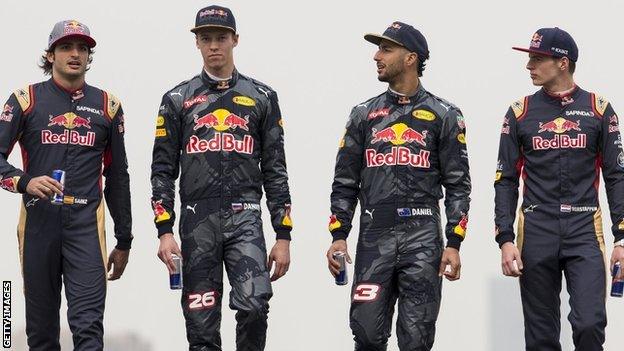
Red Bull drivers Kvyat and Ricciardo flanked by their Scuderia Toro Rosso counterparts Carlos Sainz and Max Verstappen
Lewis Hamilton's defence of his Formula 1 title could be about to get a whole lot harder courtesy of a surprise interloper - Red Bull.
The world champion already has a fight on his hands following his troubled start to the season, which has left him 36 points behind Mercedes team-mate Nico Rosberg after just three races.
Hamilton is only three points clear of Red Bull's Daniel Ricciardo, and there is reason to believe the Australian and team-mate Daniil Kvyat could become a major threat before too long.
The team that dominated F1 from 2010-13 have had two tough seasons since the advent of turbo hybrid engines. But they have shown improved form this year, and developments in the pipeline could leapfrog them into Mercedes territory.
Ricciardo was on the front row at last weekend's Chinese Grand Prix and led the race in the early laps before a puncture wrecked his chances of a podium finish.
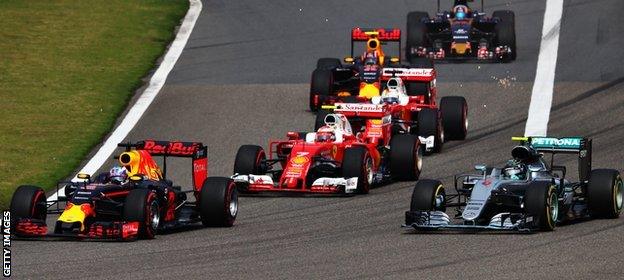
Ricciardo beat Nico Rosberg off the start and led the Chinese Grand Prix before a puncture ruined his chances
And Red Bull are hopeful an upgrade to their Renault engine due at the Canadian Grand Prix in June could help them "cause a bit of mischief ahead of us", as team boss Christian Horner put it in Shanghai.
That Renault has an upgrade scheduled for Montreal is well known. What has not yet come out publicly is how big it is.
BBC Sport can reveal Renault is predicting a lap-time gain of 0.45 seconds from the upgraded engine. Ricciardo qualified 0.52secs off Rosberg's pole position time in China.
Red Bull were further off the pace than that in the first two races in Australia and Bahrain but that is because those circuits are more "power sensitive", as F1 engineers describe the effect engine performance has on lap time.
More from Formula 1 |
|---|
The improvement Renault expect in lap time is equivalent to a power boost of just under 30bhp - and it is believed Renault's deficit to the standard-setting Mercedes is in the region of 35-50bhp.
Will the upgrade deliver what is promised?
Horner has expressed a degree of caution about the Renault upgrade - after all, it was the company's failure to deliver on its promises that led to Red Bull wanting to split with them last season.
"Let's see it first," he says. "Pieces of paper are all very easy to look at, but it is the stopwatch that doesn't lie."
In the end, Red Bull and Renault stayed together - albeit with the engine badged with the name of a sponsor - and the car company's renewed commitment to F1 following its decision to buy back Lotus and run its own team is paying off.
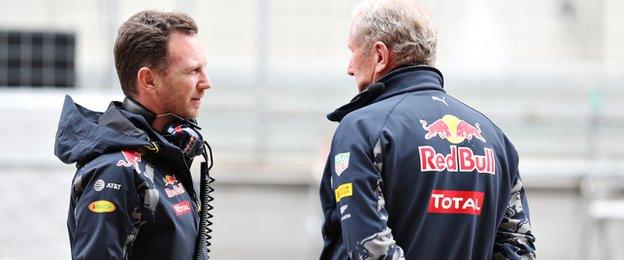
Mischief makers: Christian Horner and Helmut Marko could have a better engine than they bargained for this season
Renault improved the engine by a reputed 50bhp over the winter and insiders say they are very confident the Canada upgrade will achieve what they expect.
Even Horner - who was highly critical of his partner last season - is positive, saying: "You can genuinely see the progress that is being made."
What about the Red Bull car?
Red Bull's domination of F1 in the early part of this decade was founded on the excellence of their aerodynamic design, led by chief technical officer Adrian Newey, arguably the greatest designer in the sport's history.
Even in 2014, when Renault were a long way off on engine performance, the Red Bull chassis was at least as good as Mercedes' - and that was enough for Ricciardo to win three races when Mercedes tripped up.
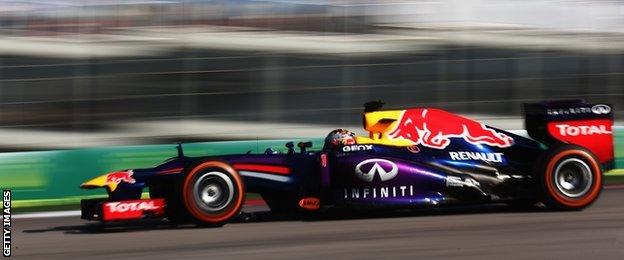
Red Bull dominated in 2013 with another chassis design from Adrian Newey that cornered beautifully...
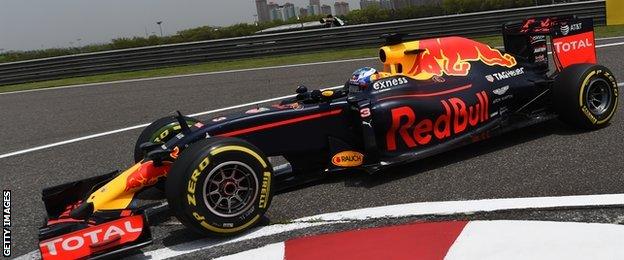
...but this year's car is faster in slow corners than the Mercedes
Last year, the Red Bull car was not up to its usual standard in the first part of the year.
From the summer onwards, though, the car returned to form and this year Red Bull have taken another step.
"We've built on getting that back," Ricciardo says. "The second half of last year, the team really turned it around, and that was really refreshing to see.
"This year we've started off on an even better footing. Definitely the vibe is somewhat like '14, and it feels good.
"It's really promising. Every race we have shown a strength we didn't think we'd have.
"We're getting there. We're definitely closing in, and if we keep closing in at this rate it's going to be a pretty spicy rest of the year."
Rivals say they can see from the GPS data available to all teams that the Red Bull is actually faster than the Mercedes in slow corners.
The Mercedes is quicker in the fast corners - but not by as much. And slow corners have a greater effect on lap time, as the cars spend longer in them.
Chinese GP: Is Nico Rosberg looking unstoppable?
Rosberg might have won all three races so far but in each his path has been eased by problems for Ferrari, Mercedes' closest rivals.
Both Mercedes and Ferrari believe the red cars are more than good enough to compete with the silver, once they stop having what Rosberg has described as "mishaps".
And if Red Bull can gain as much time as is expected, they could turn it into a three-way fight for victories.
Good news for Renault, too
An upgrade to the Renault engine as significant as the one being talked about will also provide an important boost to their works team.
This was always going to be a rebuilding year for Renault, having bought a team that had been starved of resources by its previous owners for the past few years.
Kevin Magnussen and Jolyon Palmer have been languishing close to the back this season as a result, but an extra half a second or so would lift them towards respectability at the lower end of the midfield.
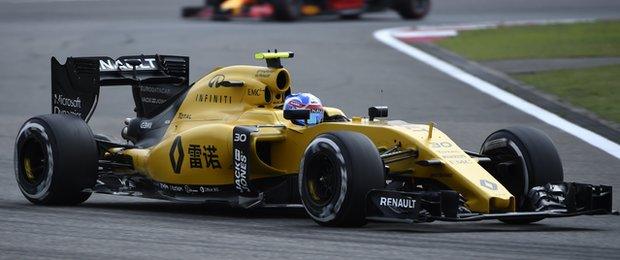
British driver Jolyon Palmer in his Renault during the Chinese Grand Prix
Renault are looking at 2017 as the first season in which they can begin to make a mark.
By then, they will have a car into which they will have been able to put much more resources than the current one, which was designed when the team was still Lotus, and another big step on the engine.
Their optimism about and expectations for next season's generation of power-unit are even higher than for the one due this summer.
- Published3 April 2016
- Published17 April 2016
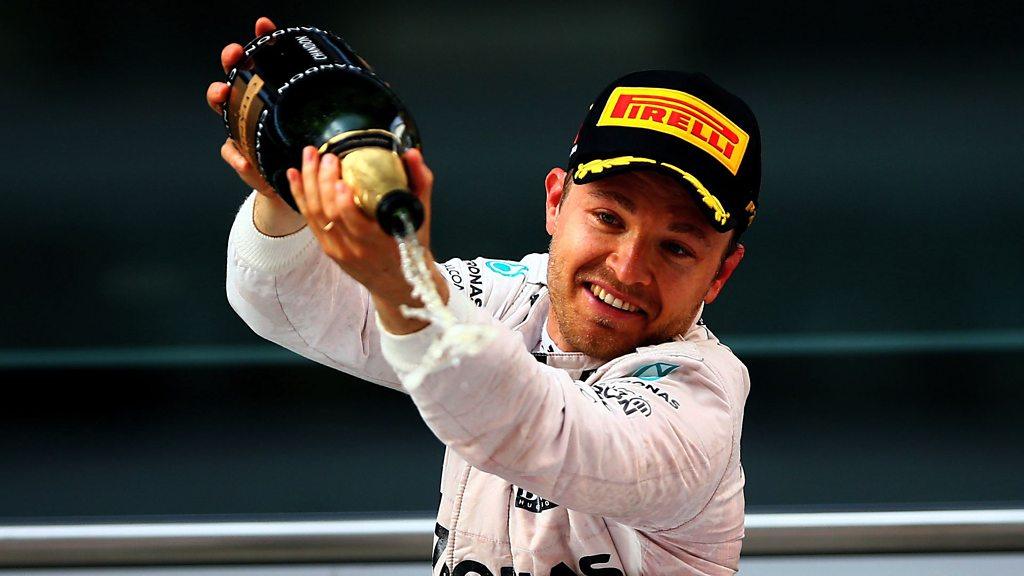
- Published17 April 2016